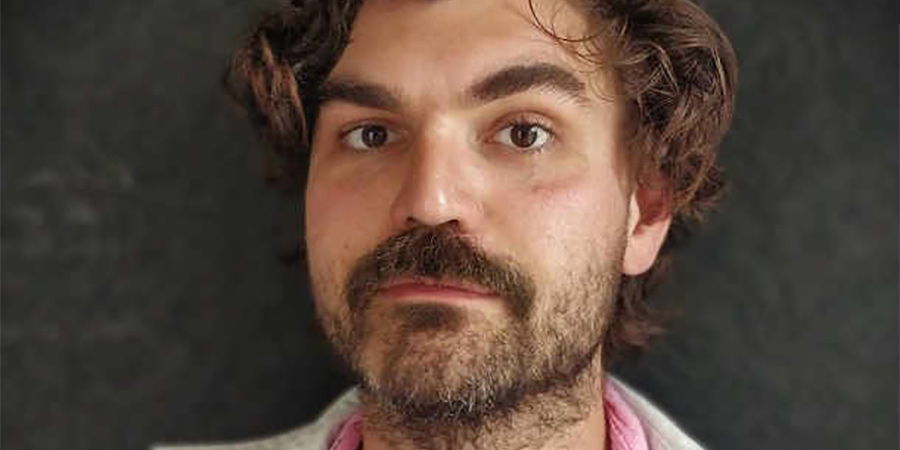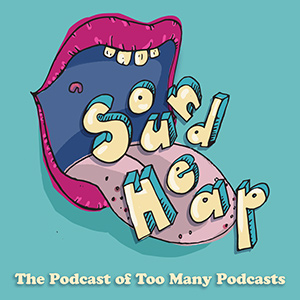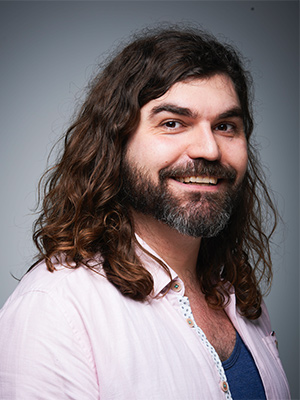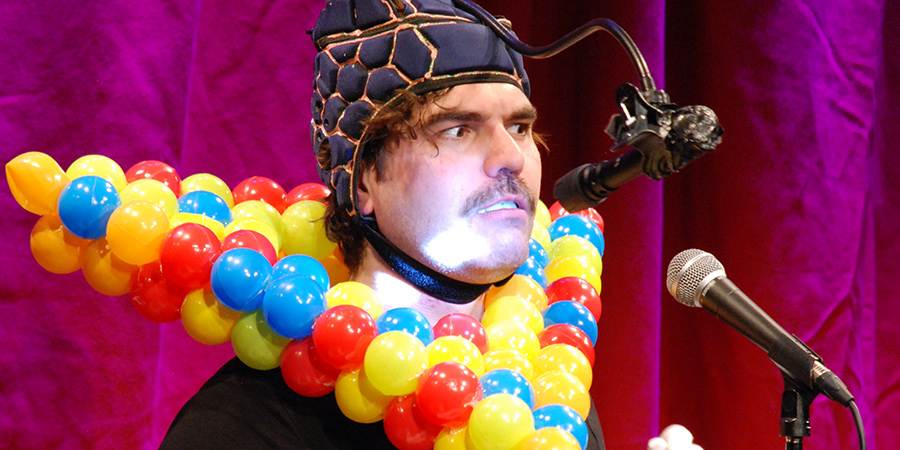My Comedy Career: John-Luke Roberts

John-Luke Roberts is an experienced comedian who - as you'll read below - has turned his hand to many interesting projects.
His latest venture is a new podcast. He "went mad during lockdown" and wrote a list of 500 made-up show titles. Those titles have turned into Sound Heap, in which top comedian guests - from Tom Allen to Isy Suttie - join his to improvise the shows on the spot.
Time to find out more about his career...
Tell us what you do in your job.
I am a comedian, writer, actor and artist. I have ideas for things I would like to exist, and then I try and make them - part of the job is pitching to people to persuade them to pay me to make things, part of the job is making things and then trying to get money for them.
How did you first get involved in the comedy industry?
I started doing stand-up at university, and made it to the BBC New Comedy Award finals at 20. I really wasn't experienced enough or sure enough of who I was to do well there, but one of the producers, Ed Morrish, liked my material, and we pitched a sketch show called Spats to what was then BBC Radio 7, and that's pretty much where things started. We did two seasons of Spats. There were lots of stops and starts after that, but that was the beginning.

What key skills do you need to be able to do your job well?
Patience, the ability to take rejection, self-assuredness, patience, the ability to take criticism, creativity, patience, the ability to finish things, the ability to let go of an idea if it's not working no matter how much work you've put into it, bloody-mindedness, self-knowledge, patience.
That said, I'm not sure I have all these skills, or I certainly don't have all of them all of the time. Patience.
What has been your biggest career achievement to date?
There's a bunch of career goals that felt very gratifying - like co-writing a sitcom (Bull) and getting it on TV, or performing at The Secret Policeman's Ball at the Hackney Empire. And I would say one of the most satisfying things was mounting my solo show All I Wanna Do Is FX GUNSHOTS with a FX GUN RELOADING and a FX CASH REGISTER and Perform Some Comedy. That was the first time I really felt I'd managed to set out to make a project, and managed to make exactly the thing I'd dreamt of making (thanks to my producers Impatient Productions and my director Sam Bailey).

The answer I'd give write now, though, is this: Launching a podcast called Sound Heap. I'm working with Ed Morrish again, for the first time since Spats, which feels like a nice homecoming. Fifteen years down the line it's also easy to see how much better we are at taking the idea we had and making it real. That said, although I think it's very, very good, I don't know if it will be successful. You never know.
And what has been the biggest challenge/disappointment?
It's very hard to isolate one thing, actually. There's so much rejection in this industry, and I still don't think I've learnt to take it well.
The trouble is, you have to put so much of yourself into every project and pitch to make it worth making, but somehow hold enough of yourself back to not be crushed when it's turned down. I've found that difficult to square.
In terms of overcoming disappointment, a few years ago I moved to making sure a large proportion of projects I worked on were things that I could make sure get made - which means avoiding gatekeepers and building relationships with producers and collaborators who believe in what I do. This means solo stage shows, and more recently my album It Is Better, and my podcast Sound Heap which we would have made whether or not somebody bought it (but luckily Auddy did).

Talk us through a typical day.
I try to do my creative work in the morning, because that's when I do it best, and my admin in the afternoon. I find it helpful when working on a big written project to set myself a target number of words to get done, after which I'm free to do other things. It helps to ban myself from using the internet until 2pm, and to meditate when I wake up. But it's a bit too easy to slip out of the habit.
Recently I've been working on Sound Heap. The first stage of the process was coming up with stupid ideas for podcasts (Like "How To Put Out A Raging Fire (Mainly Guesses)" or "Counting Up In Sixes To See How Big The Numbers Go"), then I'd sit down with a comedian and improvise a handful of them. We had nearly forty comedians in total, and the improvs would last about an hour.
So my life at the moment is listening through recordings, trying to pick the best bits to make up the 6 hours we're putting out. Sometimes this is finding a four minute section that works perfectly in its entirety, sometimes it's finding a funny sentence someone said.
Then, I write and record the linking host script, joining the whole thing together, and putting the scripts in context (sometime recontextualising them to improve the joke). Then, I hand the script to Ed, who slavishly cuts everything together and adds sounds and makes everything sound like the podcasts they're parodying.
Tell us a trick/secret/resource that you use to make your job quicker/easier.
Read and watch and listen to things that aren't comedy.
How are you paid?
It comes in fits and starts, sometimes in regular payments, sometimes in one bigger lump. I usually only know where the money is coming from for the next two or three months.
Some examples of the different types:
I write for a podcast called Troubled Waters, and this gives me a regular, but smallish, wage every month - the regularity means it's very useful.
For live performances, there'll be fees of different amounts depending on the gig, and sometimes I'll do them for free if I'm working up new material.

I got a small part in a couple of movies, and that pays more than anything else.
Sound Heap is paid in one big lump for the twelve episodes they've commissioned, and they also pay for all the contributors.
If you could change one thing about the comedy industry, what would it be?
Only one thing?!? Well. More of the money would go to the artists actually making the comedy.
What tips would you give for anyone looking to work in your area of the industry?
There's so many unpredictable things about the industry. My main advice would be don't get distracted from making what you want to make and being who you are. Stick to your guns, and compromise just enough to get it made, but not more. In an industry which has so very many artists, your best calling card is being authentically who you are, and bringing the ideas only you could have.
Sound Heap is available weekly on Apple, Spotify and all other podcast providers.


